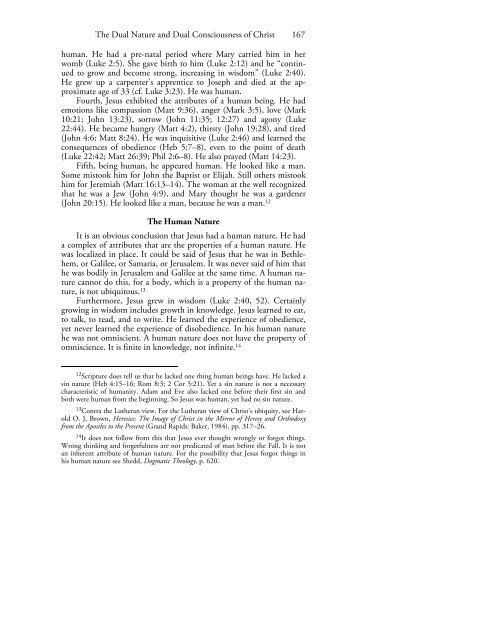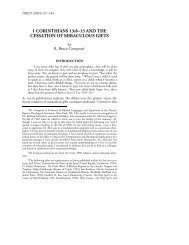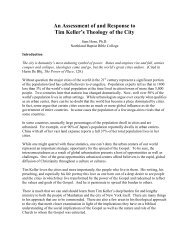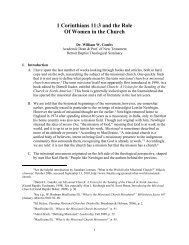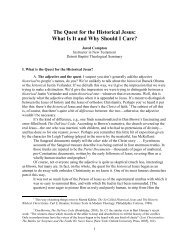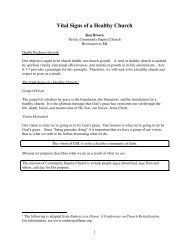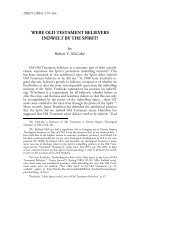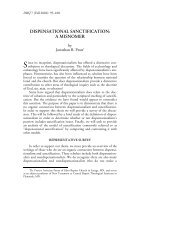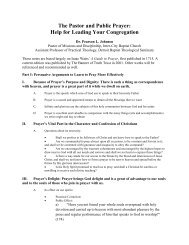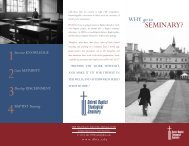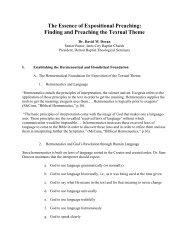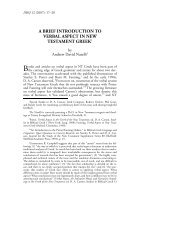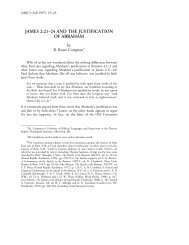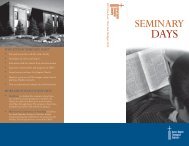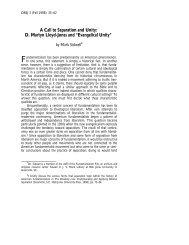Samuel A. Dawson - Detroit Baptist Theological Seminary
Samuel A. Dawson - Detroit Baptist Theological Seminary
Samuel A. Dawson - Detroit Baptist Theological Seminary
- No tags were found...
Create successful ePaper yourself
Turn your PDF publications into a flip-book with our unique Google optimized e-Paper software.
The Dual Nature and Dual Consciousness of Christ 167human. He had a pre-natal period where Mary carried him in herwomb (Luke 2:5). She gave birth to him (Luke 2:12) and he “continuedto grow and become strong, increasing in wisdom” (Luke 2:40).He grew up a carpenter’s apprentice to Joseph and died at the approximateage of 33 (cf. Luke 3:23). He was human.Fourth, Jesus exhibited the attributes of a human being. He hademotions like compassion (Matt 9:36), anger (Mark 3:5), love (Mark10:21; John 13:23), sorrow (John 11:35; 12:27) and agony (Luke22:44). He became hungry (Matt 4:2), thirsty (John 19:28), and tired(John 4:6; Matt 8:24). He was inquisitive (Luke 2:46) and learned theconsequences of obedience (Heb 5:7–8), even to the point of death(Luke 22:42; Matt 26:39; Phil 2:6–8). He also prayed (Matt 14:23).Fifth, being human, he appeared human. He looked like a man.Some mistook him for John the <strong>Baptist</strong> or Elijah. Still others mistookhim for Jeremiah (Matt 16:13–14). The woman at the well recognizedthat he was a Jew (John 4:9), and Mary thought he was a gardener(John 20:15). He looked like a man, because he was a man. 12The Human NatureIt is an obvious conclusion that Jesus had a human nature. He hada complex of attributes that are the properties of a human nature. Hewas localized in place. It could be said of Jesus that he was in Bethlehem,or Galilee, or Samaria, or Jerusalem. It was never said of him thathe was bodily in Jerusalem and Galilee at the same time. A human naturecannot do this, for a body, which is a property of the human nature,is not ubiquitous. 13Furthermore, Jesus grew in wisdom (Luke 2:40, 52). Certainlygrowing in wisdom includes growth in knowledge. Jesus learned to eat,to talk, to read, and to write. He learned the experience of obedience,yet never learned the experience of disobedience. In his human naturehe was not omniscient. A human nature does not have the property ofomniscience. It is finite in knowledge, not infinite. 1412 Scripture does tell us that he lacked one thing human beings have. He lacked asin nature (Heb 4:15–16; Rom 8:3; 2 Cor 5:21). Yet a sin nature is not a necessarycharacteristic of humanity. Adam and Eve also lacked one before their first sin andboth were human from the beginning. So Jesus was human, yet had no sin nature.13 Contra the Lutheran view. For the Lutheran view of Christ’s ubiquity, see HaroldO. J. Brown, Heresies: The Image of Christ in the Mirror of Heresy and Orthodoxyfrom the Apostles to the Present (Grand Rapids: Baker, 1984), pp. 317–26.14 It does not follow from this that Jesus ever thought wrongly or forgot things.Wrong thinking and forgetfulness are not predicated of man before the Fall. It is notan inherent attribute of human nature. For the possibility that Jesus forgot things inhis human nature see Shedd, Dogmatic Theology, p. 620.


